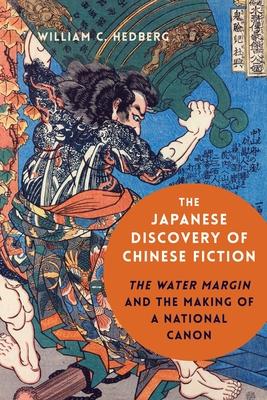The classic Chinese novel The Water Margin (Shuihu zhuan) tells the story of a band of outlaws in twelfth-century China and their insurrection against the corrupt imperial court. Imported into Japan in the early seventeenth century, it became a ubiquitous source of inspiration for translations, adaptations, parodies, and illustrated woodblock prints. There is no work of Chinese fiction more important to both the development of early modern Japanese literature and the Japanese imagination of China than The Water Margin.
In The Japanese Discovery of Chinese Fiction, William C. Hedberg investigates the reception of The Water Margin in a variety of early modern and modern Japanese contexts, from eighteenth-century Confucian scholarship and literary exegesis to early twentieth-century colonial ethnography. He examines the ways Japanese interest in Chinese texts contributed to new ideas about literary canons and national character. By constructing an account of Japanese literature through the lens of The Water Margin's literary afterlives, Hedberg offers an alternative history of East Asian textual culture: one that focuses on the transregional dimensions of Japanese literary history and helps us rethink the definition and boundaries of Japanese literature itself.
Book
The Japanese Discovery of Chinese Fiction: The Water Margin and the Making of a National Canon
(Write a Review)
Hardcover
$72.22
The classic Chinese novel The Water Margin (Shuihu zhuan) tells the story of a band of outlaws in twelfth-century China and their insurrection against the corrupt imperial court. Imported into Japan in the early seventeenth century, it became a ubiquitous source of inspiration for translations, adaptations, parodies, and illustrated woodblock prints. There is no work of Chinese fiction more important to both the development of early modern Japanese literature and the Japanese imagination of China than The Water Margin.
In The Japanese Discovery of Chinese Fiction, William C. Hedberg investigates the reception of The Water Margin in a variety of early modern and modern Japanese contexts, from eighteenth-century Confucian scholarship and literary exegesis to early twentieth-century colonial ethnography. He examines the ways Japanese interest in Chinese texts contributed to new ideas about literary canons and national character. By constructing an account of Japanese literature through the lens of The Water Margin's literary afterlives, Hedberg offers an alternative history of East Asian textual culture: one that focuses on the transregional dimensions of Japanese literary history and helps us rethink the definition and boundaries of Japanese literature itself.Hardcover
$72.22